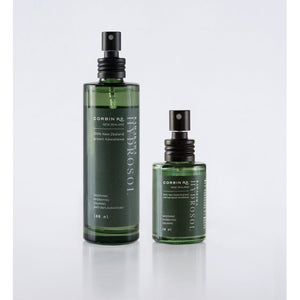If you've been around the beauty and wellness industry for a while, you've probably heard of the "cleanse." It's that thing where you drink a bunch of water and eat nothing but kale for three days. Then it's over, and you go back to eating whatever you want.
Well guess what? There's a better way! And it doesn't involve depriving yourself or feeling weak and hungry all the time. You can actually eat your way to beautiful skin by choosing foods that are good for your body—and your skin!
Skin health is just as important as overall health, and it's not something you should neglect. Your skin is the largest organ in your body; if you don't take care of it, you could be at risk for more serious health problems later on down the road.
But what exactly does healthy skin look like? Is it actually possible to eat your way to beautiful skin? The answer is yes! There are many foods that can help keep your skin healthy and glowing. Read Gina's post below to find out more about the best food for skin.
Eat your way to beautiful skin
Gina Urlich
BHSc Clinical nutritionist
Hydrate (Aim for 2 liters of filtered water a day).
Water prevents the skin from drying out or becoming flaky. It becomes a physical barrier against external physical and chemical damages and helps flush out toxins accumulated in the skin.
Beautiful foods:
Vitamin A works by normalizing skin functions by increasing blood flow to the surface of the skin, exfoliates and makes the skin smooth, repairs the cellular structure of the epidermis, optimising UV protection, decreases sebum production and treats acne, improves hydration in and around skin cells. Vitamin A is also a great anti ageing nutrition, reducing lines, wrinkles, dull skin and spots. Good sources of vitamin A include cod liver oil, carrots, sweet potato, dark green leafy vegetables, egg yolk, mint, pumpkin, mango, and apricots.
Vitamin C is an effective antioxidant. It stimulates the production of collagen in the skin, which is responsible for making the skin supple. Vitamin C is highly effective at reducing free radical damage, such as that caused by overexposure to the sun, pollution or toxins. It is anti-inflammatory, maintains the integrity of connective tissue and cell membranes and promotes wound healing. Foods high in vitamin C include broccoli, strawberries, citrus fruits, parsley, rosehip tea, red capsicum, berries, kiwi fruit, green leafy vegetables and paw paw.
Vitamin E is a fat-soluble vitamin antioxidant and functions best when used with vitamin C. It helps fight free radicals, reduces the appearance of age spots, wrinkles, stretch marks and lines. Vitamin E stabilises cell membranes and can absorb the energy from UV light, preventing skin cancers. Vitamin E is found in food oils such as olive oil, avocado oil, macadamia oil, coconut oil, flaxseed oil, sunflower seeds, almonds, leafy green vegetables, egg yolk, and corn.
Essential Fatty Acids are responsible for skin repair, moisture content, skin flexibility and will dissolve the fatty deposits that block pores and cause acne. EFA’s repair the skin damaged by pimples and blemishes and aid in cell and tissue communications. They prevent dry and flaky skin as well as aid in hydration. Food sources include cold-water fish (sardines, salmon, mackerel herring), flax seeds, walnuts, nut oils and cod liver oil.
Zinc is especially useful for acne sufferers. It acts by controlling the production of oil in the skin and can control some of the hormones that create acne. Zinc is required for wound healing, proper skin cell proliferation, improves immune function, reduces inflammation, High levels are found in oysters, pumpkin seeds, egg yolks, sea food, whole grains, ginger and beef.
Silica is a trace mineral that strengthens the body’s connective tissues, muscles, tendons, hair, ligaments, nails, cartilage, and bone and is vital for healthy skin. Silica deficiency can result in reduced skin elasticity and can hamper the body’s ability to heal wounds. It assists in collagen synthesis and improves the resilience of connective tissue. Found sources of silica include leeks, green beans, chickpeas, strawberries, cucumber, mango, celery, asparagus and rhubarb.
Antioxidants reduce inflammation and protect cell membranes. They reduce the damage of sunburn and overexposure to UV light as well as increase hydration to the skin. Green tea is high in antioxidants and also high in polyphenols, which are compounds that eliminate cancer causing free radicals. Nutrients which are antioxidants include selenium, vitamin A, vitamin C and vitamin E which have discussed above. Eat a large range of colourful fruits and vegetables to receive a bounty of antioxidants to keep your skin youthful!
Bone Broths are rich in collagen which is needed to make skin supple and radiant. Collagen-rich bone broth will supply your skin with the tools that it needs to support itself. Bone broth also contains many other minerals and compounds that benefit the entire body.
Be mindful of the following
Sugar, Gluten, Alcohol, Caffeine & all processed and packaged foods. They are inflammatory and can be any underlying driver behind skin issues.
Stress less
Stress causes all kinds of hormonal havoc. The best way to re-balance our hormones is to actually breath and create a calm environment. Do yoga!! Slow down! Practice deep breathing daily!
Sleep
Give your body a chance to regenerate new cells, please! With restorative sleep we have improved mood, better hormonal function & digestive system. We are essentially the health of our cells, and cellular repair takes place during sleep.
Go for natural skin products
A good natural skin care products that work with your skin. Corbin Rd is a potent blend of nature’s best botanical oils. It calms inflammation & soothes irritated skin.
Exercise and sweat it out!
Gets the blood flowing! Releases stored toxins and impurities.
Exfoliate
Get rid of the dead cells. Use a dry brush for circulation and lymph drainage, or use an exfoliation cloth like this. Keeping your blood flowing and promoting lymph drainage can help keep your skin glowing!



